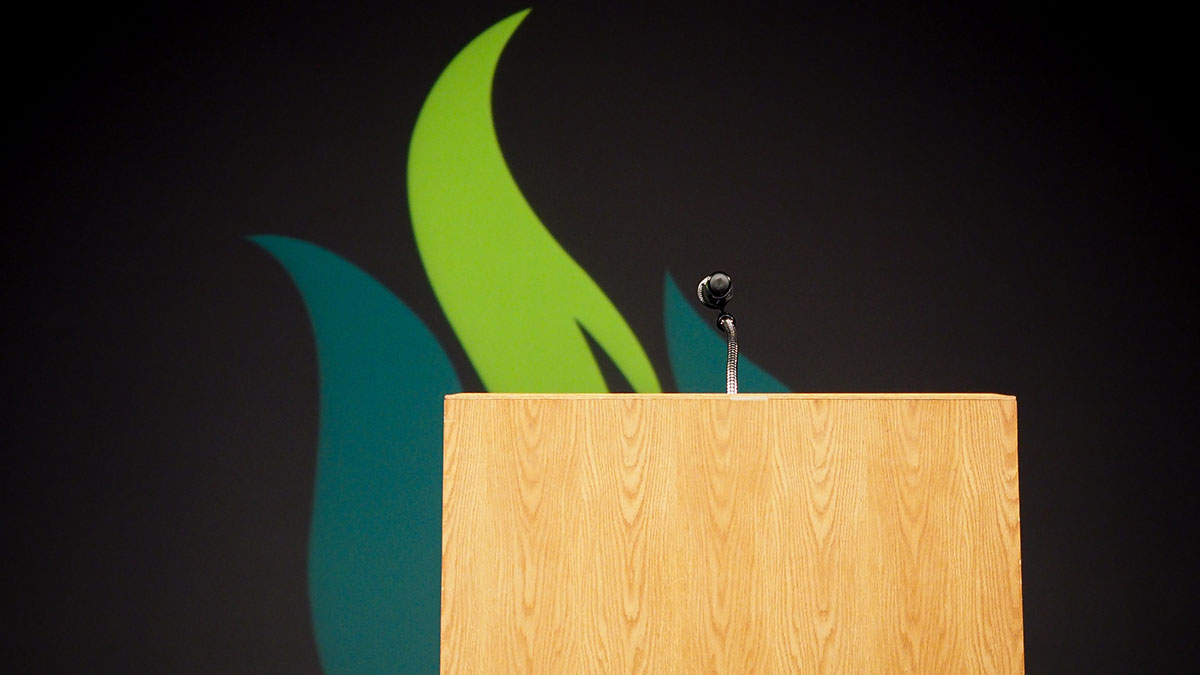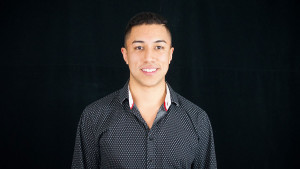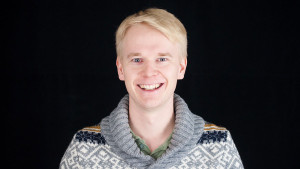SU Elections Q&A: VP (External)
 Ab Sch
Ab SchPatrick Cajina

Reed Larsen

Mike Sandare

Why are you running?
Patrick Cajina: Honestly, because of my own financial situation. Though we are making strides on provincial and federal levels to alleviate student debt. I don’t think they’re going far enough and I don’t think that the protections and supports that are in place are doing enough for students who are graduating. For example, I’m in my fifth-year and will be convocation this summer, and I’m going to be graduating with $40,000 in debt. It also contributes to the problem where I’m not able to move forward and find a job, hopefully in my field, that will keep me employed rather than the 40 per cent of youth that are underemployed today and the 17 per cent of youth that are unemployed.
Reed Larsen: I’m running for VP (External) because it had a lot to do with that I’m a huge believer in representation, and the fact that as a student community if we all don’t take representation seriously, and if we all don’t take the fact that we are developing ourselves here to create a better future for ourselves to push our agendas,to eventually build something out of our education, that requires us all to take voting and representation seriously.
Mike Sandare: Last year I was VP of a club, and while I was there I felt I made a lot of really big changes. I was able to provide students with employment, I was able to see what happens when you bring someone in for 12 months, or 18 months, and it was just a really good feeling. So in my mind, if I was able to help all of these people, then I’ll be able to help other people as well. Just looking at the state of the university, everything that I’m doing helps everyone. I’ve seen how things like high tuition costs and low employment rates and mental health can affect my friends, and I’ve seen how it can affect me. Because of that, that’s why I’m running.
Students might not think that their voice matters in provincial and federal politics. What is your response to that, and how would you improve it?
Cajina: I think it absolutely matters, I think it’s fairly evident given that we have our provincial and national lobby organizations constantly advocating on behalf of students and the way we kind of measure that success is how governments respond to that in their budgets and platforms. We’ve seen the NDP be very responsive to a tuition freeze that is taking place over these next two years. We’ve seen the federal government pay more attention to students, especially with Justin Trudeau being a young prime minister, he has said on multiple occasions of how important it is for students to involve themselves in the political process aside from voting that only happens every four years.
Larsen: The way I look at it, and I think it has a lot to do with how you approach the issue, the way I’ve tried to develop my speech, and the way I’m approaching this problem is that it’s not an “I” problem. It shouldn’t be “You should vote to pledge because it will be better for you.” That’s not how it works. if we all do it together, like we, we, we, we, we, right? If we are all part of it, to all vote, if we were to achieve 100 per cent voter turnout, that would be 30,000 students who would all be better off for it. It’s those small pressures of an entire community that really start to get things moving.
Sandare: I think students’ voices completely matter when it comes down to things like provincial and federal politics. When we all come together, we can make a change. I completely believe that we’re here in university because we’ve been given a shot at something greater, because we know how we want to contribute, because we know how we want to help. And by banding together we are able to give ourselves a larger voice, we are able to push through exactly what we want to see in the future, because the future is ours.
What are your thoughts on the Alberta NDP government led by Rachel Notley and what they’ve done in their for the post-secondary sector?
Cajina: I think it is very promising, I think it shows a renewed investment and dedication to post-secondary in Alberta. The only thing that I think the next VP (External) should be cautious about is playing too friendly with the government because that’s when we lose our ability to go against them. Traditionally, the NDP has been very student friendly, and hopefully that trend will continue, but it’s important for the SU to remain impartial and non-partisan.
Larsen: Well for students, they came in and they did what I would call political moves. So they came in and they froze tuitions, they froze these ideas of non-mandatory instructional fees but they were just freezes. There was no legislation involved in a lot of it. A lot of it was just coming in and saying, “You know, you can’t do that as a university.” So if we’re constantly pushing an NDP government to lower tuitions, or fund programs, or create jobs just for students, or all these things, it’s not the government who’s going to come back with these things.
So these tuition freezes, these promises of building new buildings on campus, like Alberta campus, things like mental health funding that’s coming up right away, all of these things they could turn into just political favours instead of just long-term sustainable development. Right now, it’s been more of political one-offs.
Sandare: They’re not bad. When it comes down to it, I like that she was able to implement the tuition freeze right away. That’s by far my favourite. Of course, it’s unfortunate that the tuition freeze doesn’t extend to international students as well. It’s unfortunate there is that little bit of a loophole there, however that’s something that I’d like to fix.
So you’re at a table with Premier Rachel Notley. If you were to bring up your single biggest concern with Alberta post-secondary, what would it be?
Cajina: I would say affordability would be the biggest one for me. I don’t think post-secondary education should be a debt sentence, and traditionally it has been viewed as an opportunity for more social mobility, to improve your life and enrich the lives of others, and it’s a way to move out of poverty. The first thing for me is affordability because what good is a degree if you’re $50,000 in debt at the end of it?
Larsen: Right now, and the reason why I’d choose this is slightly more personal, would be long-term mental health funding. And the structure of how we go about doing that. It’s kind of one of those funny things where it’s going to happen, we kind of know that there’s going to be funding for mental health services on campuses, but I really believe there’s a certain way to do it that is quite a bit better, and I believe that way to be pursuit of funding.
Sandare: My single biggest concern with Alberta post-secondary right now is that it’s become really hard for students to get employment. Even if you look into engineering – with electrical engineering this year, there were only three students who were able to get co-op. I think that’s a very, very big issue. Yes, universities should be about academics, yes it should be about bettering yourself and becoming something more. But I think that also ties into students wanting to be in the career field of their choice. And going through academia, I personally believe that students should be able to have that say. They should be able to determine their own future, be it research, be it career-based, be it whatever it is.
We have a new Minister of Advanced Education who was just sworn in earlier this year. If elected, what would you do to build a relationship with him?
Cajina: I have had a couple of encounters with Marlin Schmidt as he’s the MLA of my riding. Before he became the Minister of Advanced Education, I had met with him regarding issues related to CSJ related to putting in French services and helping Francophone immigrants integrate into the Bonnie Doon community, also known as the French Quarter. I think from that standpoint, he may not remember me but we had a good working relationship and I’d continue to build on that.
Larsen: Obviously to build a new relationship with somebody every single time you go in to do a lobby meeting is really rough, it’s hard. How would I deal with that sort of thing, and how I would continue to approach those things, I think it’s an active approach, it’s trying to not force your name into somebody’s agenda, but to say, to drop a line and say “Hi, I’m here and this is what I do. I’m VP (External) and I really would like to talk to you about these things. Or CAUS would really like to talk to you.
Sandare: To be honest, I really believe in a personal touch. I would sit down with Marlin Schmidt, I’d see if we’d be able to set up a meeting that wasn’t just in an office where we could talk about things, but where I could learn, first off, why he chose to become Minister, why he joined the NDP, why he came into power there. He became the Minister of Advanced Education because he really wanted to make a change in that sector, and by doing, that I believe that there must be reasons why he’s there and how he wants to be able to help students.
Are you concerned with the high turnover rate in Advanced Education Ministers?
Cajina: Yeah, I think that’s something that it’s tough to answer because with that turnover it does provide an opportunity for someone new to look at the situation with fresh eyes, at the same time, it shows that there is a lack of continuity within the government and perhaps with the policies they look to implement. Ideally, I’d like to see more stability on that front, but that’s something we can’t control, and have to roll with the punches.
Larsen: Turnover is an unfortunate thing in general. It’s something that’s really hard to avoid especially with governments. I know for myself personally, I would have very little problems working professionally with turnover. Mostly because, even in the professional world, you’ll be working with somebody new every other time that you have a business opportunity. You’ll end up trying to have a sales pitch every time you go into a meeting. And that’s how most of my small business stuff works.
Sandare: I think everyone is. It’s tough to build a long-lasting relationship when there is that high turnover rate, however that always means that there are new ideas being brought in. To be honest, I’m not too worried about it, just because being the VP (External), being that voice that advocates for the students, who is out there to represent their needs, you need to be able to adapt.




